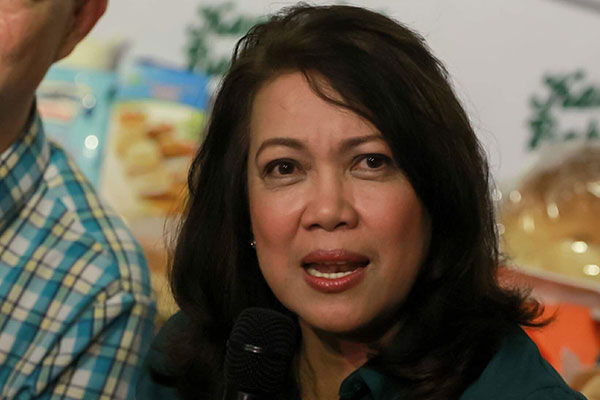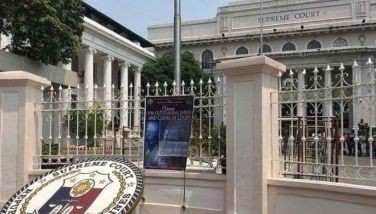CJ did not fake, tinker with resolutions, says lawyer

Lawyer Jojo Lacanilao said there was no truth to claims by Justice Teresita Leonardo-de Castro that Sereno had misrepresented the collegial decision of the Supreme Court in ordering the creation of the Regional Court Administrative Office (RCAO) in Region 7 through Administrative Order No. 175-2012 without the approval of her colleagues as required by their internal rules. Efigenio Toledo IV/Philstar.com, File
MANILA, Philippines — She did not tinker with any court resolution or delay acting on a request for the transfer of a case against terrorists to a court outside Mindanao, a spokesperson for Chief Justice Maria Lourdes Sereno said yesterday, belying testimonies of her fellow magistrate before a congressional panel hearing an impeachment complaint against her.
Lawyer Jojo Lacanilao said there was no truth to claims by Justice Teresita Leonardo-de Castro that Sereno had misrepresented the collegial decision of the Supreme Court in ordering the creation of the Regional Court Administrative Office (RCAO) in Region 7 through Administrative Order No. 175-2012 without the approval of her colleagues as required by their internal rules.
“Precisely, the creation of said office, its budget as well as the designation of its staff, had already been approved and delineated in earlier resolutions of the court,” he explained. Lacanilao argued there was nothing illegal or irregular in the issuance of such order.
“The Chief Justice, after studying the problems besetting far-flung courts, simply implemented these earlier Court resolutions creating an RCAO in the seventh judicial region,” he stressed.
Sereno’s camp also denied De Castro’s testimony that the high court overturned the Chief Justice’s order in a full-court resolution that nullified her administrative order.
Lacanilao dismissed the issue involving the RCAO as an “internal matter” which the SC justices should “resolve among themselves internally.”
“The Chief Justice did not fake any resolution. The order she drafted was according to her understanding of the decision on the RCAO,” he explained.
He also said the committee on justice, chaired by Oriental Mindoro Rep. Reynaldo Umali, may have been too lenient in its treatment of De Castro, who he sees as biased witness.
He cited Rule 132 of the Rules of Evidence, which provides that “a witness may be asked as to any matters stated in his testimony, or connected therewith, with sufficient fullness and freedom to test his accuracy and truthfulness and freedom from interest or bias, or the reverse, and to elicit all important facts bearing upon the issue.”
“The credibility of a resource person is equally important as his actual testimony. Bias of a witness is a relevant factor in hearing testimonial evidence. A witness can be impeached by showing that he has a reason to misrepresent facts because he is biased in favor of a party, prejudiced against a party or has an interest in the outcome,” the lawyer added.
De Castro appeared before the House panel yesterday, upon go-signal from the SC, and testified that Sereno had issued orders “without getting the approval of the Supreme Court.”
She specifically cited Sereno’s AO issued on Nov. 27, 2012 creating the Judiciary Decentralized Office (JDO) and reopening RCAO-7 in Cebu.
Sereno also appointed Geraldine Faith Econg, then head of the SC’s program management office who is now a justice in the Sandiganbayan, as head of RCAO-7.
The administrative case involving the RCAO controversy was among the 27 issues raised in the impeachment complaint filed by lawyer Lorenzo Gadon. The issue was raised to justify Sereno’s impeachment for culpable violation of the Constitution, betrayal of public trust, corruption and other high crimes.
De Castro also said the Chief Justice violated court rules when she issued a blanket temporary restraining order on the Commission on Elections’ proclamation of party-lists in 2013.
Blanket TRO
She said that as member-in-charge of the case, she recommended the issuance of TRO on Senior Citizens party-list’s case, but Sereno instead issued a blanket TRO that was “grossly unprocedural because she included third parties who were not included in the case.”
But Sereno’s camp said the Chief Justice has the last say on cases while the Court is on recess and that the member-in-charge can also give recommendations.
“Since Justice De Castro was merely ‘recommending’ a course of action to the Chief Justice, and further considering that the proposed ‘temporary restraining order’ was merely a ‘draft,’ the Chief Justice can wholly accept, modify or even reject Justice De Castro’s recommendation,” Lacanilao stressed.
“The Chief Justice could not be accused of falsifying anything. In the exercise of her own discretion and authority to issue TROs when the Court is in recess, the Chief Justice elected to issue a temporary restraining order under terms she considered just and proper,” he added.
De Castro also testified on the merits of the decision she penned that declared as unconstitutional the clustering of shortlisted nominees made by the Judicial and Bar Council (JBC) last year in connection with vacancies in the Sandiganbayan.
She also discussed the merits of her separate concurring opinion in the August 2014 ruling that voided the JBC’s decision not to include the name of then solicitor general Francis Jardeleza on the shortlist of nominees for SC justice post after Sereno raised an integrity issue against him.
The senior magistrate was joined by SC Court Administrator Jose Midas Marquez in testifying before the impeachment hearing. He discussed the administrative processes in the high court.
Apart from Justice De Castro, the House panel also invited Associate Justices Jardeleza and Noej Tijam, retired Associate Justice Arturo Brion, spokesman Theodore Te, clerk of court Felipa Anama and chief judicial staff officer Charlotte Labayani. All of them skipped the hearing for various reasons.
Also yesterday, Sereno’s camp denied allegations in the impeachment complaint that she caused the delay in the transfer of criminal cases against arrested members of Maute terrorists.
At Tuesday’s hearing, Justice Secretary Vitaliano Aguirre II accused Sereno of causing the delay and endangering the security of individuals involved in the case.
“It took the Supreme Court only eight days to act on the initial request of Secretary Aguirre that the Maute and related cases be transferred to Taguig City. The Supreme Court received Secretary Aguirre’s request on 29 May 2017. It issued its resolution thereon on 6 June 2017,” the lawyer explained, citing the first ruling assigning to the Cagayan De Oro regional trial court the rebellion cases against the arrested Maute members and supporters.
As for Aguirre’s appeal, Lacalinao said the SC discussed it barely 14 days later, or on June 27. He pointed out the SC released a resolution 14 days later.
“Under these circumstances, the accusation of ‘intentional delay’ is baseless,” Lacanilao added. Moreover, he said Sereno could not be faulted since the actions on the transfer of Maute cases were made collegially by the Court.
Sereno’s appeal
Earlier yesterday at a forum in Parañaque, Sereno reminded government officials of their oath to uphold and protect the Constitution. Heads and officials of constitutional commissions attended the forum.
“This is our collective oath. Unless we really live out that oath in our hearts, in our day-to-day lives, we are worthless as public servants,” she said.
“We all took and assumed our office under that oath. We cannot turn our backs on our oath because we have all vowed to uphold the Constitution, the Constitution that cannot be suspended even for a minute,” she added.
“There is nothing to fear if we abide by the Constitution. But if we will violate it, then that is the time that we will be hounded by our conscience.”
In her speech, Sereno also stressed the significance of strengthening the constitutional commissions, highlighting their role in ensuring accountability in the government.
She was referring to the Office of the Ombudsman, the Commission on Audit, the Commission on Elections, the Commission on Human Rights and the Civil Service Commission.
“The design of accountability is not just the three branches (executive, legislative and judiciary) checking each other. We have to include the three commissions, the ombudsman and the CHR,” said Sereno.
‘We cannot just expect the judiciary to be the only institution that is strong. It will not be enough if the five others are weak,” she added.
The Chief Justice noted that having strong independent institutions can ensure stability even during instances of political turmoil hounding the other branches of government.
“We have a measure of stability if the commissions, the CHR, the ombudsman and the judiciary, remain independent and professional... There is stability to ensure that development will go on even if politics is turbulent,” said Sereno.
For her part, Ombudsman Conchita Carpio-Morales said the Constitution is designed to ensure the independence of the constitutional commissions to enable them to discharge their mandate without fear or favor.
“The concentration of power to one person is clearly antithetical to any decent form of government,” said Morales.
“In establishing the structures of government, the ideal that the Constitution seeks to achieve is one of balance among the three great departments of government: the executive, legislative and judiciary,” she added.
CHR Chairman Chito Gascon said the Chief Justice has the right to face her accusers or choose the lawyers to represent her in the impeachment proceedings.
“Every person has value. Every person has rights... Even the highest officials of the land have rights,” Gascon said in Filipino.
“It is guaranteed by the Constitution that every person would be valued and accorded with rights,” he added. –Janvic Mateo
- Latest
- Trending




























